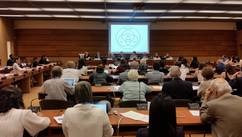
GCED Basic Search Form
Quick Search
You are here
News

Bringing together Member States, UN agencies and civil society, the seminar provided a valuable opportunity to explore connections between initiatives from around the world promoting Human Rights Education in response to SDG Target 4.7
What is Human Rights Education and how is it connected to SDG Target 4.7? What current trends, initiatives and examples can be identified from around the world and what are the interconnections between them? These questions were the focus of the seminar “How can human rights education be promoted through the Education 2030 Agenda, especially target 4.7?”, held on 30 May 2017 in the Palais des Nations, Geneva.
Moderated by Claire de Lavernette, Chair of the NGO Working Group on Human Rights Education and Learning, the event was opened by H.E. Mr Maurizio Enrico Serra, Ambassador, Permanent Representative of Italy, and Mr Abdulaziz Almuzaini, Director of the UNESCO Geneva Liaison Office. The panel featured Ms Lydia Ruprecht of the Section of Education for Sustainable Development and Global Citizenship, UNESCO; Mr Gilberto Duarte Santos, Crime Prevention and Criminal Justice Officer, UNODC; Ms Elena Ippoliti, Human Rights Officer, OHCHR, and Ms Giorgia Magni of IBE-UNESCO.
SDG Target 4.7 stands as an unparalleled recognition of the importance of education in achieving sustainable development that is just, peaceful and inclusive. In this context, the seminar offered a timely opportunity to learn about action in Human Rights and Global Citizenship Education from around the world in support of the Education 2030 Agenda.
In his opening remarks, Mr Almuzaini welcomed the discussion as “an occasion to highlight new synergies, to encourage complementary action, and to explore fresh perspectives for shared initiatives.” He went on to stress that “realising the full potential of Human Rights Education requires the cooperation and mobilisation of actors and partners across all sectors, and at all levels.”
Representing the States Platform on Human Rights Education and Training comprising Brazil, Costa Rica, Italy, Morocco, The Philippines, Senegal, Slovenia and Thailand, Ambassador Serra emphasised the importance of international cooperation in education as the basis for building peace, underscoring that “all countries can learn by coming together” to advance Human Rights Education around the world.
As the United Nations’ specialized agency for education, UNESCO has been entrusted to lead and coordinate the implementation of the Education 2030 Agenda through the Education 2030 Framework for Action, working with Member States, civil society and a broad range of partners around the world.
Ms Ruprecht presented UNESCO’s transversal action in the field of Global Citizenship Education, from the establishment and monitoring of targets for the implementation of SDG 4.7, to working with Member States to build capacities across learning environments. Emphasising that “Global Citizenship Education can take many forms around the world”, she highlighted its role in “empowering learners with the values, behaviours, attitudes and knowledge to contribute as citizens”.
Mr Duarte Santos shared perspectives on UNODC’s work on Education for Justice (E4J), which builds on and complements UNESCO’s programme on the Prevention of violent extremism through education (PVE-E). He stressed the importance of inter-agency cooperation in advancing Human Rights Education around the world.
This message of collaboration was echoed by Ms Ippoliti, who outlined OHCHR initiatives to raise awareness of fundamental rights and freedoms through education, building skills and capacities on the ground in line with the Plan of Action on the World Programme for Human Rights Education.
Highlighting the “cross-cutting relevance of Global Citizenship Education to education systems and curricula”, Ms Magni emphasised the role of IBE in research, training and capacity building, as well as in facilitating dialogue between stakeholders.
The diversity of complementary approaches and initiatives shared by the speakers prompted lively discussion on multiple dimensions of human rights education, including the challenges of monitoring progress, the role of civil society in advancing human rights education action in non-formal settings, and the need to promote examples of positive impact and good practices to further multiply synergies and opportunities for learning.
Going forward, the information and perspectives shared during the event are expected to support the work of Member States in promoting Human Rights Education and Training within the Human Rights Council and beyond.
To find out more about UNESCO’s programme on Global Citizenship Education, please visit: http://en.unesco.org/gced
To learn about UNESCO’s role in leading the Education 2030 Agenda, please visit: http://en.unesco.org/education2030-sdg4
